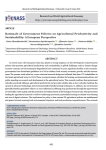Chatzitheodoridis F., Spinthiropoulos K., Loizou E., Kalfas D., Kalogiannidis S., Gortsilas E. (2025). Rationale of government policies on agricultural productivity and sustainability: a European perspective. Research on World Agricultural Economy, 01/06/2025, vol. 6, n. 2, p. 605-628.
https://doi.org/10.36956/rwae.v6i2.1712
https://doi.org/10.36956/rwae.v6i2.1712
| Titre : | Rationale of government policies on agricultural productivity and sustainability: a European perspective (2025) |
| Auteurs : | F. Chatzitheodoridis ; K. Spinthiropoulos ; E. Loizou ; D. Kalfas ; S. Kalogiannidis ; E. Gortsilas |
| Type de document : | Article |
| Dans : | Research on World Agricultural Economy (vol. 6, n. 2, June 2025) |
| Article en page(s) : | p. 605-628 |
| Langues : | Anglais |
| Langues du résumé : | Anglais |
| Catégories : |
Catégories principales 06 - AGRICULTURE. FORÊTS. PÊCHES ; 6.2 - Politique AgricoleThésaurus IAMM POLITIQUE GOUVERNEMENTALE ; POLITIQUE AGRICOLE ; AGRICULTURE ; DURABILITE ; PRODUCTIVITE ; RENDEMENT DES CULTURES ; EUROPE |
| Résumé : | In recent years, the European Union has placed a strong emphasis on the development of government policies that promote agricultural productivity and sustainability. As global challenges such as climate change, resource scarcity, and environmental degradation have continued to pose significant hurdles to EU countries, governments have formulated guidelines in a bid to address food security, economic growth, and the environment. The present study relied on a cross-sectional research design and collected data from 278 stakeholders in the Greek agricultural sector in 2023. These were government subsidies for farming, environmental policies, and public spending on research and development in the agricultural sector. This research confirms that government subsidies positively influence agricultural productivity and provides reliable data on how subsidies facilitate the spread of advanced technology and environmentally friendly farming techniques. In addition, the environment generally benefits agriculture where it is most influential in affecting crop productivity through the improvement of soil health, water quality, and the protection and enhancement of the biological resource base. The government funding for agricultural research is vital for reinforcing innovation, particularly focusing on climate-wise farming and use of digital solutions. The implication for policy is that current EU agricultural policies are multilayered and geared towards meeting both environmental objectives and food production competitiveness. This research fills the gap in knowledge on the EU agriculture and can serve as a guideline for further reforms in Europe and in the rest of the world. |
| Cote : | En ligne |
| URL / DOI : | https://doi.org/10.36956/rwae.v6i2.1712 |







